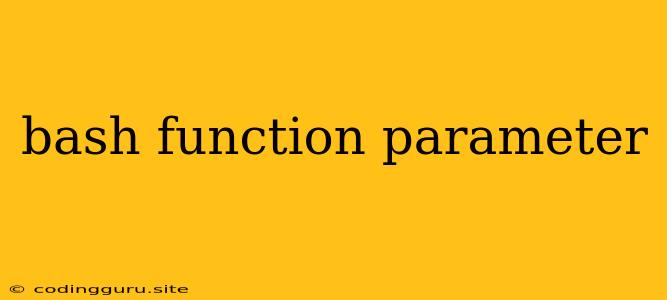Bash Functions: Adding Flexibility with Parameters
Bash functions are powerful tools for organizing and reusing code within your shell scripts. They allow you to bundle a set of commands into a named block, which can be executed with a single command. But what if you need to pass different values to your function? That's where bash function parameters come into play.
Parameters act as placeholders within your function, allowing you to pass in specific values at runtime. This makes your functions much more versatile, adaptable to different situations.
Understanding Parameters
When you define a function, you can declare parameters using the same syntax as positional arguments. Let's illustrate with a simple example:
function greet {
echo "Hello, $1! How are you today?"
}
In this function, $1 represents the first parameter passed to greet. When you call the function:
greet "Alice"
The value "Alice" is assigned to $1, and the output will be:
Hello, Alice! How are you today?
Working with Multiple Parameters
Bash functions can handle multiple parameters. The order of parameters matters, and they are accessed using consecutive numbers starting from $1. Let's create a function that calculates the sum of two numbers:
function sum {
total=$(( $1 + $2 ))
echo "The sum is: $total"
}
To use this function:
sum 10 20
The output will be:
The sum is: 30
Best Practices
-
Use Descriptive Names: Choose parameter names that clearly indicate their purpose. For example,
file_path,message,num_items. -
Document Your Parameters: Within your function, add comments explaining what each parameter is for. This helps others (and your future self!) understand how the function should be used.
-
Handle Missing Parameters: Always check if all required parameters have been provided. You can use
ifstatements to catch cases where a parameter is missing.
function calculate_area {
if [ $# -lt 2 ]; then
echo "Error: You must provide both length and width."
return 1
fi
area=$(( $1 * $2 ))
echo "The area is: $area"
}
- Avoid Using Unnecessary Parameters: Keep your function signatures clean and easy to understand. If a value is readily available within the function's context (e.g., a global variable), don't force users to pass it as a parameter.
Advanced Techniques
- Positional Parameters (Shift): The
shiftcommand allows you to adjust the position of parameters. It shifts the positions of all parameters to the left, effectively dropping the first parameter.
function process_data {
echo "First argument: $1"
shift
echo "Second argument: $1"
}
- Named Parameters: While Bash doesn't have built-in support for named parameters (like
--nameor-f), you can usegetoptsor other techniques to simulate this behavior.
Example: A Function with Multiple Parameters
Let's create a function that prints a message with specific formatting and options:
function print_message {
# Set default values
color="green"
bold=false
# Process optional parameters
while getopts ":c:b" opt; do
case $opt in
c) color=$OPTARG ;;
b) bold=true ;;
\?) echo "Invalid option: -$OPTARG" >&2 ; exit 1 ;;
esac
done
# Print message with formatting
if $bold; then
message=$(printf "\033[1m$1\033[0m")
else
message="$1"
fi
printf "\033[${color}m${message}\033[0m\n"
}
# Call the function
print_message "This is a message"
print_message -c blue "This is another message"
print_message -b "This message is bold"
print_message -b -c red "This message is bold and red"
This function accepts optional parameters -c to set the text color and -b to make the text bold. It utilizes getopts to parse these options and apply the desired formatting to the message.
Conclusion
Bash function parameters are crucial for creating flexible and reusable functions. By passing information to your functions, you enhance their capability and make them more adaptable to different situations. Mastering parameters is an essential step in writing efficient and effective Bash scripts.
